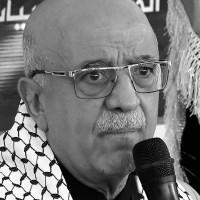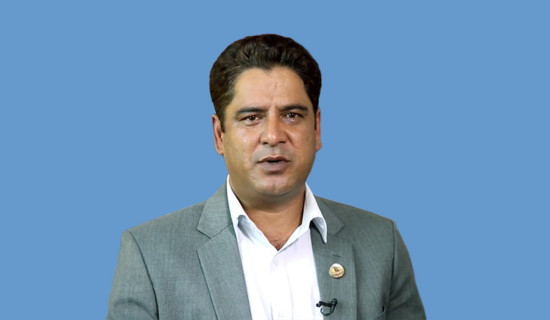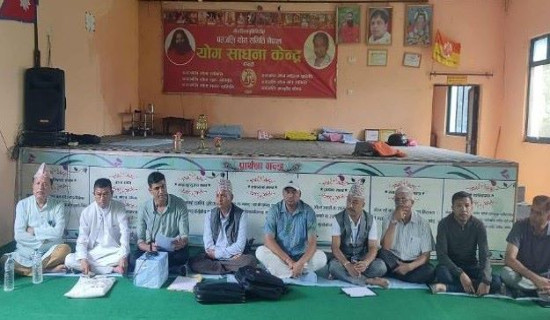- Sunday, 31 August 2025
Netanyahu leaves US without Gaza deal
Washington, July 12: Israeli Prime Minister Benjamin Netanyahu's trip to Washington this week netted President Donald Trump another nomination for the Nobel Peace Prize he covets, but the ceasefire the U.S. leader sought for the war in Gaza didn't emerge.
Despite Trump throwing his weight behind a push for a 60-day truce between Israel and Hamas, no breakthrough was announced during Netanyahu's visit, a disappointment for a president who wants to be known as a peacemaker and has hinged his reputation on being a dealmaker.
"He prides himself or being able to make deals, so this is another test case," said Rachel Brandenburg, the Israel Policy Forum's Washington managing director and senior fellow.
Trump's ability to strike a ceasefire deal in the 21-month war will reveal the boundaries of his influence with Netanyahu, especially after their recent joint strikes on Iran's nuclear facilities that both leaders touted at the White House this week.
Beyond the back-to-back meetings Trump and Netanyahu had at the White House this week, there was little public evidence of progress at a time when the Republican U.S. president is pushing to end the fighting.
Secretary of State Marco Rubio said Thursday that when it comes to a ceasefire in Gaza, "we're closer than we've been in quite a while and we're hopeful, but we also recognize there's still some challenges in the way."
Rubio, who spoke to reporters while traveling in Kuala Lumpur, Malaysia, also said that Trump "wants to see a ceasefire and we've invested a lot of time and energy."
Beyond ending the bloodshed, ending the war in Gaza would give Trump more leeway to strike some of the broader agreements he seeks in the Middle East, such as expanding the Abraham Accords that started in his first term and normalizing relations with Syria's new government.
It's unclear how much pressure Trump put on Netanyahu in their private talks this week. But the two leaders came into the visit seeming more aligned than ever — at least for now — fresh off the president having twice come to the Israeli leader's assistance.
Trump made the risky move to join Israel's attacks on Iran last month, delivering pivotal U.S. firepower while alarming world leaders and some of Trump's "America first" supporters. Trump also inserted himself into Israel's domestic affairs, calling for Netanyahu's yearslong corruption trial to be thrown out.
That's a marked turnaround in their relationship, which had appeared somewhat strained in recent years.
Trump shocked some of his fellow Republicans and staunch supporters of Israel by publicly criticizing Netanyahu not long after Hamas attacked Israel on Oct. 7, 2023, setting off the conflict.
Even during his last visit to the White House earlier this year, Netanyahu seemed caught off guard when Trump announced the U.S. would hold talks with Iran over its nuclear deal rather than embrace Netanyahu's push for military pressure.
With their military objectives aligning for a time on Iran, the Israeli leader has worked to foster a warmer relationship.
In his visit to Washington this week, the Israeli leader also showed he knows how to praise the president in a way that matters greatly to him when he unveiled a letter in front of reporters and cameras to announce he had nominated him for a Nobel Peace Prize.
Those gestures, though, may only carry him so far as Trump pushes for a deal that Netanyahu may not be able to accept.
Netanyahu, like many Israelis, believes Trump is the greatest friend they have ever had in the White House and is deeply grateful for the U.S. strikes on Iran's nuclear sites last month.
But the Israeli leader is also under mounting public pressure to end the war as hostages languish in captivity and more Israeli soldiers are killed in guerrilla-style attacks.
Israel's military success against Iran has given him some political capital, but if he ends the war while leaving Hamas intact, he will have broken his repeated promise of "total victory."
His far-right coalition partners have threatened to bolt if he does that, sparking early elections that could end his nearly unbroken 16 years in power and leave him more vulnerable to long-standing corruption charges.
That may prove too heavy a price for delivering the kind of lasting ceasefire sought by Trump and demanded by Hamas. Instead, Netanyahu, who is seen as a masterful politician by friends and foes alike, is expected to thread the needle.
In a video statement on Thursday, Netanyahu said that he would agree to a "temporary" 60-day ceasefire in return for the release of half the hostages remaining in Gaza, many of whom are believed dead, and that he would begin negotiations on ending the war.
But he conditioned any lasting ceasefire on Hamas giving up its arms – something the militants have refused to do as long as Israel occupies parts of Gaza.
If Hamas can be disarmed through negotiations, "so much the better," Netanyahu said. "If it is not achieved through negotiations in 60 days, we will achieve it in other ways — by using force." (AP)



-original-thumb.jpg)












